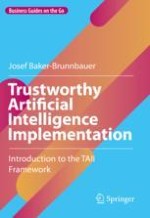2023 | OriginalPaper | Buchkapitel
3. Ethics and Moral
verfasst von : Josef Baker-Brunnbauer
Erschienen in: Trustworthy Artificial Intelligence Implementation
Aktivieren Sie unsere intelligente Suche, um passende Fachinhalte oder Patente zu finden.
Wählen Sie Textabschnitte aus um mit Künstlicher Intelligenz passenden Patente zu finden. powered by
Markieren Sie Textabschnitte, um KI-gestützt weitere passende Inhalte zu finden. powered by
